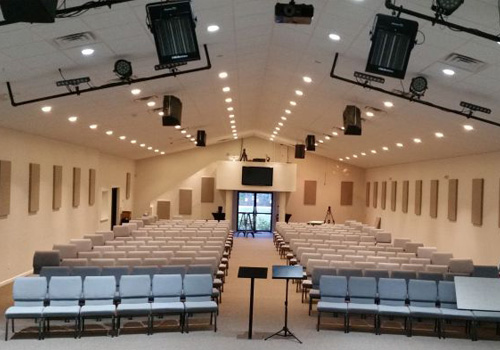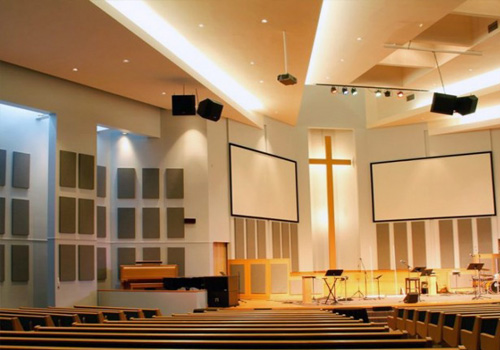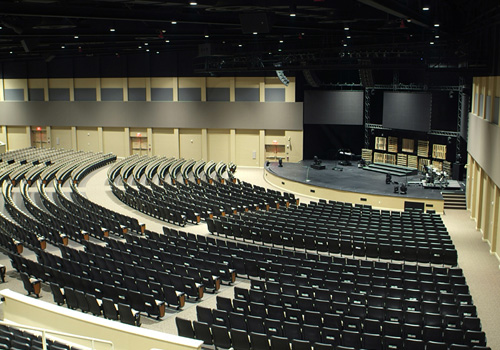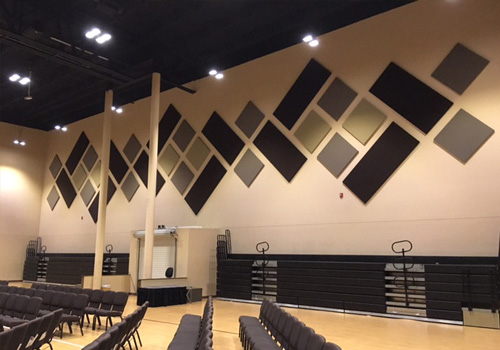Religious Facility Noise Control
Memtech Acoustical designs, supplies, and installs well-engineered noise control products for all types ofreligious facilities.
Churches and Religious Facilities
Memtech Acoustical designs effective noise control solutions for any type of church, synagogue, and other religious facilities.
Controlling noise in churches is essential for creating a conducive environment for worship, prayer, and reflection. Memtech Acoustical designs effective noise control solutions for any type of church, synagogue, and other religious facilities.
It is essential to control excessive reverberation to assure that the spoken word and musical performances can be clearly heard by all in attendance. Poor sound quality is common in churches because of an abundance of hard surface materials such as brick, marble, stone, tile, glass, wood and sheet rock. All of these materials are acoustically reflective and can create intolerable levels of reverberation (echo) as well as to “amplify” the sounds of rustling papers, movement in pews, etc. Our acoustic panels are designed to absorb sound energy and reduce a room’s overall noise and reverberation, creating interiors that “reduce the din without sacrificing the divine”.
Using carpeting, area rugs, and soft furnishings such as padded pews or chairs can also help absorb sound and reduce reverberation within the church interior. In addition, the use of reflective splays placed on walls or ceilings can help direct speech or music to a desired ‘focal point’ (e.g. congregation) within the sanctuary.
The reduction of ambient (background) noise will improve the overall experience and ensure that participants are not distracted or otherwise bothered by unwanted sounds. Our soundproofing expertise will address sound transmission through walls, windows, and doors, and can minimize external noise intrusion and reduce distractions during church services. Upgrading windows and doors using improved acoustical products and sealing gaps and cracks can be effective measures.
Even the most strategically placed PA speakers can’t compensate for poor room acoustics. An overall engineered noise-management system must be considered to assure that optimum listening conditions are achieved in all locations within a large room or hall.

Acoustical Ceiling Tiles

Acoustic Treatments
Diffusers are designed to scatter sound waves in different directions, helping to break up standing waves and reduce acoustic anomalies in the church environment. They can be installed on walls and ceilings to enhance sound diffusion and create a more balanced acoustic environment.
Low-frequency sound waves can accumulate in corners and create acoustic issues such as boomy or muddy sound. Bass traps are designed to absorb these low-frequency waves and improve bass response within the church space. They are typically installed in corners and along walls where low-frequency buildup is most prominent.
Reflectors: Reflectors are used to redirect sound waves towards specific areas of the church, such as the congregation or choir loft, to enhance clarity and projection. Reflectors can be installed on walls, ceilings, or other surfaces strategically to optimize sound distribution within the space.
Acoustic Clouds: Suspended acoustic clouds are panels or baffles that are hung from the ceiling to absorb sound reflections and reduce reverberation. They can be customized in size and shape to fit the architectural design of the church while providing effective acoustic treatment.

Speakers are positioned strategically to provide even coverage throughout the venue, with consideration for the audience area, sightlines, and potential obstacles. We also ensure proper selection and integration of different speaker components to deliver balanced sound.
A graphic or parametric equalizer can be used to adjust the frequency response of the PA system. Fine-tuning the EQ settings to compensate for room acoustics, speaker characteristics, and specific audio sources is then undertaken, using a real-time analyzer with microphones placed around the listening area to provide optimum settings. PQ system feedback (“howl”) suppression techniques are used to prevent unwanted feedback loops. We then identify problematic frequencies and apply notch filters or feedback eliminators as needed. Adjust microphone placement and monitor levels to minimize the risk.
Utilizing signal processing tools such as compressors and limiters to enhance the quality and intelligibility of the audio signal is also evaluated.
Balancing the levels of individual audio channels achieve a cohesive and well-blended sound mix.

Fabric-covered baffles provide effective sound absorption while allowing for customization with different fabric colors and textures. Alternatively, acoustic baffles made from wood, metal, or composite materials can add a distinctive aesthetic touch to the space.
These acoustic baffles are designed for easy installation and can be suspended from ceilings or walls using mounting hardware or suspension systems. This flexibility allows for creative placement and configuration to achieve both acoustic and visual objectives. Some aesthetic acoustic baffles can be integrated with lighting fixtures or HVAC (Heating, Ventilation, and Air Conditioning) systems to serve dual functions while maintaining a cohesive design aesthetic.
All materials are “Class A” fire rated and are durable and resistant to humidity or other environmental conditions.
